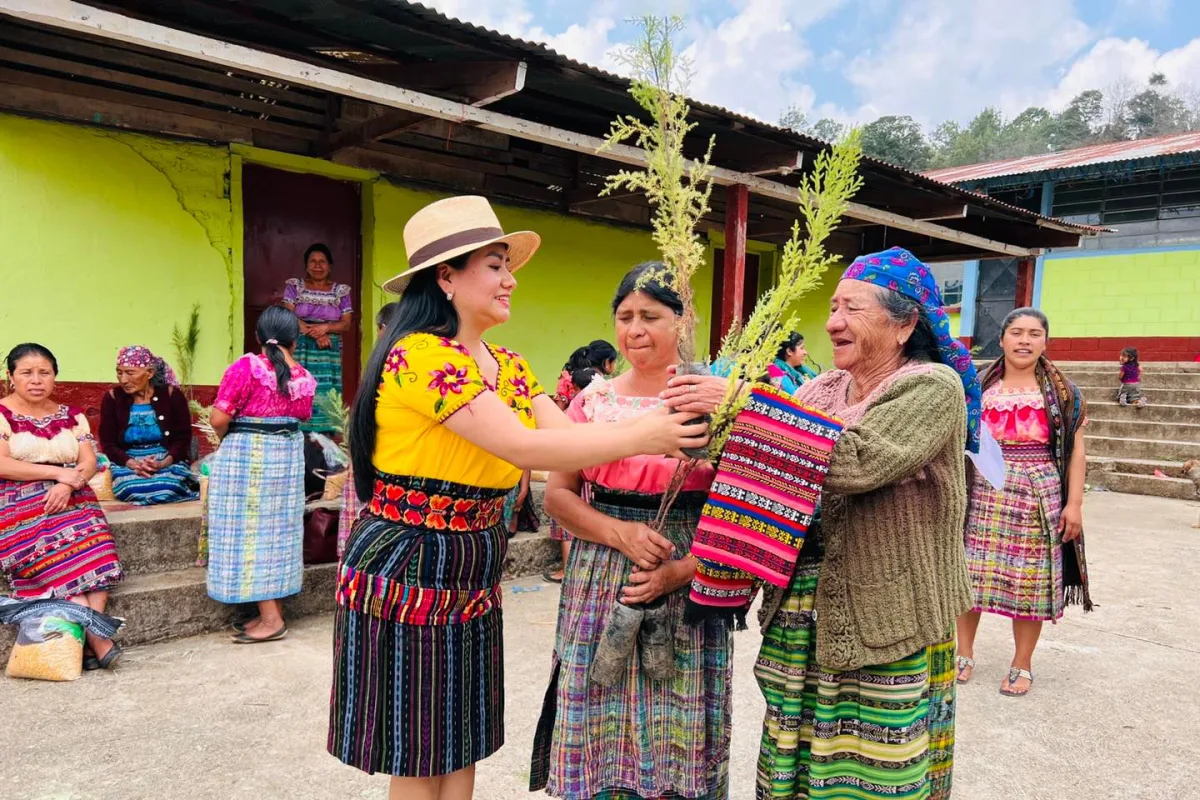
Photos: MASHAV
The history of development activity has taught us that only a combination of national policy reforms blended with grass roots capacity building, can bring about real change. This combination is the backbone of the State of Israel’s long standing international development cooperation activity worldwide, as being implemented by MASHAV, Israel’s Agency for International Development Cooperation, Ministry of Foreign Affairs.
Daunting development challenges are presently aggravated by the impact of climate instability and constant change, which exacerbate other stress-creators, often with negative outcome for livelihoods, especially for people living in poverty under challenging conditions. These very challenges are inextricably entwined with the challenges of sustainable development, since risks are unevenly distributed and are generally greater for disadvantaged people and communities in countries at all levels of development. Within this context, it is imperative to implement an integrated innovative approach, one that combines all components of development assistance.
Much has been written about the meaning of sustainable development, however, because sustainable development involves a process of change, ownership and responsibility and is reliant upon local contexts, needs and interests.
Since its establishment, MASHAV has been active in 140 countries worldwide, directly training more than 350,000 men and women in a broad variety of fields. We base our approach of placing people at the heart of development on the belief that development transcends the attainment of economic security and growth, and is rather defined by an individual’s capability and freedom to choose and achieve the life they value. Empowering individuals with the skills and tools to overcome development challenges leads to the transformation of communities, and in turn, of entire societies.
Success in the present builds undoubtedly on lessons from the past. As we mark MASHAV’s 65th anniversary, we look back proudly at our accomplishments while moving forward towards the universal goal of achieving worldwide sustainable development and social equity, with a strong emphasis and commitment to leave no one behind.
Israel’s official international development cooperation program was launched in 1958 with the aim of sharing with the rest of the developing world the know-how and technologies that make up the basis for Israel’s own rapid development.
After achieving independence in 1948, scientific research and technological development were key factors in rebuilding the country to become a modern state. New and innovative technologies were developed to meet the challenges of a growing country with scarce natural resources. From the earliest years of statehood, Israel’s leaders were moved by a compelling desire to share the knowledge gained from Israel’s own development experience with the newly independent countries of Africa and Asia.
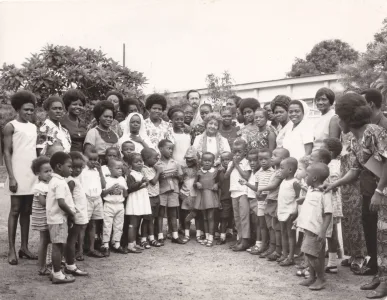
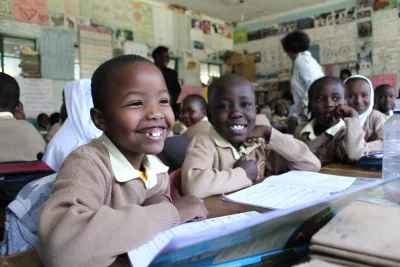
Nigeria: Early Childhood Education (70s)
David Ben-Gurion, Israel’s first prime minister, believed that “…the principles of mutual assistance and equality should also constitute the basis for international relations between people… [and] must be based on the solidarity of all human beings, derived from fraternity and mutual assistance in every sphere of life – the economic, social and scientific.”
In 1958, then Foreign Minister Golda Meir visited Africa for the first time. Deeply moved by the challenges the young nations faced while struggling for independence, she returned convinced that Israel must play a significant role in assisting these nations in dealing with problems of health, education, malnutrition, low status of women, and the struggle for resources. She explained that “Human and economic development in Africa is a drive toward universal self-determination and justice.”
Golda Meir’s personal commitment to international cooperation led to the creation of MASHAV as a special Division for International Cooperation within Israel’s Ministry of Foreign Affairs. The MASHAV mission was, in her own words, “to unselfishly share know-how with the African people.”
Although at the time Israel itself was still a developing country, it had, nevertheless, a bilateral aid program comparable, relative to the size of its economy, to that of the major developed-country donors of the time. MASHAV was the government organ responsible for managing the aid program, and grew to become the largest department in Israel’s Ministry of Foreign Affairs.
Just a year after its inception, MASHAV was dispatching hundreds of advisors and technical assistants all over the developing world, training thousands of participants in medium- and long-term courses in agriculture, medicine, trade union management, cooperatives, empowerment of women and community and rural development, both in their own countries and through a network of training institutes across Israel.
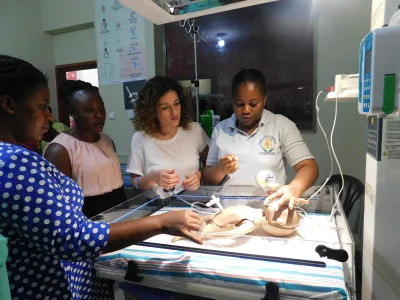
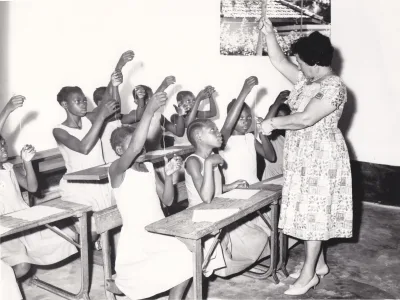
Kenya: Empowering women and girls (60s)
Two intertwined factors enabled the rapid growth of Israel’s aid program during such a short period of time. The first was the firm steadfast moral commitment of Israeli leaders based on the Jewish principle of ‘Tikkun Olam’ (Repairing the World), of cooperating with the developing world. The second was the strong demand from both beneficiary countries and multilateral agencies for Israeli expertise during the early decades of international development.
During these formative years, Israel instituted diplomatic relations with thirty-three African nations. In 1961, David Ben-Gurion writes on his ‘Essay on International Development’: “From the start of the State, before the tide of independence swept over Africa, our Government has deemed it a principle aim of foreign policy to form links with the peoples of Asia and help their development forwards as far as it could, within the limits of our modest economic and technical resources… Israel has been granted the great historic privilege, which is also a duty, of helping to solve the gravest problem of the 20th century: the problem of the dangerous gap between Asia and Africa on the one hand and Europe and America (and Australia) on the other. Nothing but the closing of this gap can bring about true fraternity and international cooperation.”
Sixty-five years later, MASHAV is in a unique position in the international development arena in two very important aspects:
Proven solutions to development challenges. As a country that has gone through the transition process from a developing country in the 1950s into a donor country and the 33rd member of the OECD in less than 70 years, we feel we can share with others our firsthand experience in development. MASHAV makes available the wealth of knowledge and expertise accumulated in Israel to meet today’s development challenges.
The message that difficulties and development challenges are surmountable. If one considers the hardships that Israel had to face: difficult climatic conditions; large waves of new immigrants arriving from different countries and backgrounds; a hostile neighborhood; very poor infrastructure; and few natural resources – then success is possible for other countries as well.
As a small agency, MASHAV had to carefully plan its programming in order to bring about the desired impact and change. Therefore, the following guidelines were set:
- Concentrate on fields and disciplines in which Israel has a comparative advantage, know-how and experience.
- Be effective: result-oriented and demand-driven instead of supply driven.
- Develop horizontal partnerships and focus on human capacity building. A single individual can change an institution, a community, policy, and reality. This is our inspiration.
MASHAV has earned its place as a world-renowned aid agency, enjoying global recognition and standing, and a valued partner in the field of aid and development. Moreover, MASHAV has become a strategic and political arm of the State of Israel, serving Israel’s international objectives and foreign policy in alignment with the 2030 Sustainable Development Agenda.
Severe challenges lie ahead. Millions of lives are at stake. The global goal of eradicating poverty and ensuring food security is the common thread that links us all, renewing our resolution to fight for a better, dignified and sustainable future for all.
We remind ourselves that emerging from the past is a journey, not a destination. And achievements along this journey – be them small or large – help us touch the lives of millions of people around the globe. Development is a partnership that requires the commitment of all.
Reflecting the spirit of Israel’s international development cooperation program, MASHAV’s ultimate goal is to bring change, hope and opportunity for every single human being, sharing knowledge, expertise and ideals to make our world a better place.
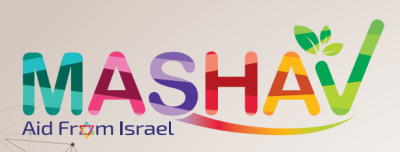
For more information: MASHAV website









